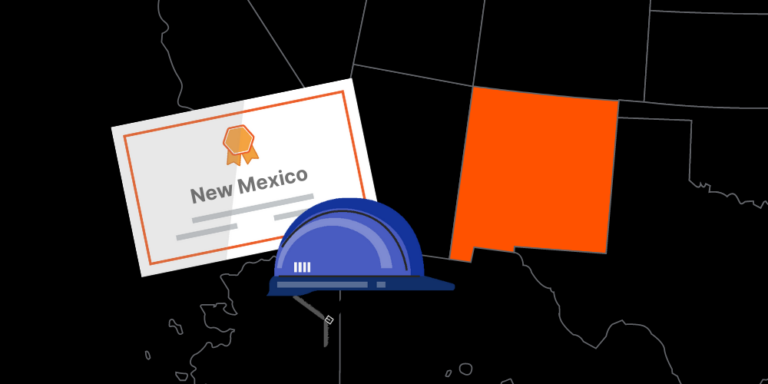— 4 min read
New Mexico Contractor Licensing: Guide to Requirements
Last Updated Jun 11, 2024
Last Updated Jun 11, 2024

Who needs a contractor license in New Mexico? New Mexico requires a license for anyone engaged in construction-related contracting within the state. This includes general contractors and specialty contractors including electrical, mechanical, plumbing, and more — over 100 different classifications of licenses in total. The only exception to the rule is contracting businesses with less than $7,200 in revenue each year, which do not require a license.
If you're starting a new construction business or doing business in New Mexico for the first time, you can take advantage of the guide below to learn more about the New Mexico contractor licensing process.
Table of contents
How to get a New Mexico contractor license
All construction contractors need to go through the New Mexico Regulation & Licensing Department for their licenses. And, officially, it’s the Construction Industries and Manufactured Housing Division (CID) that handles the licenses.
But the CID doesn’t handle any of the testing. For that, New Mexico turns to a third-party testing company called PSI. For the most part, the entire process goes through PSI, right up until CID issues you a license.
The following steps apply to all contractor types.
1. Request for classification determination
Before a contractor can apply for testing, they must submit a classification determination request. While filling out this request, contractors will describe the types of work they do in as much detail as possible, the industry in which they intend to work (railroad, utilities, public works, etc.), and whether or not they intend to work as the prime contractor.
Once the request is completed, would-be contractors need to mail it to the following address and wait for their classification before applying for an exam:
New Mexico Construction Licensing Services
2820 Broadbent Pkwy NE, Ste E & F
Albuquerque, NM 87107
Phone: 877-663-9267
Fax: 505 433 5266
2. Obtain a qualifying party certificate
Each contractor must have a qualifying individual with the required experience for each classification covered by the license. This individual is the person that must have the necessary work experience.
Here are the work experience requirements.
Two years (4,000 hours):
- Residential Building (GB-2) and Building Specialties
- (GS-1 through GS-34)
- Asphalt Bitumen and Concrete Construction (GA-1
- through GA-5)
- Fixed Works (GF-1 through GF-9)
- Residential Wiring (ER-1) and Electrical Specialties
- (ES-1 through ES-10)
- Mechanical Specialties (MS-3 and MS-6)
Four years (8,000 hours):
- General Building (GB-98)
- Asphalt Bitumen and Concrete Construction (GA98)
- Fixed Works (GF-98)
- Electrical- Residential and Commercial (EE-98)
- Electrical Distribution Systems (EL-1)
- Mechanical (MM-98)
- Plumbing (MM-1)
- Natural Gas Fitting (MM-2)
- HVAC (MM-3)
- Process Piping (MM-4)
- Fire Sprinklers (MS-12)
- Dry Chemical Fire Protection (MS-14)
Once your company has a qualified person, you must complete a qualified person pack. That packet needs to include a complete and notarized qualifying party application and a complete and notarized work experience verification form. Along with those documents, applicants will also have to include a $30 fee, plus $6 for every additional classification. Also, include a self-addressed and stamped envelope.
Mail or hand-deliver the packet to:
PSI Services LLC
2820 Broadbent Pkwy NE, Suite E&F
Albuquerque, NM 87107
Phone: 877-663-9267
3. Schedule and take an examination
If all of the qualified individual packets and work experience are accepted, PSI will notify you that you can schedule an examination. Don’t delay on this step. You only have six months from the type PSI approves your application, else you’ll forfeit your application fees and have to start over. And, once you pass the exam and receive a certificate, you need to attach it to a valid license within 12 months from the date of the exam.
4. Submit an application for licensure to PSI
Fill out an application for your license and mail it to PSI. That license application must include:
- A $36 application fee
- Proof of a license bond
- A tax registration number issued b the Department of Tax and Revenue
- A copy of the Qualifying Person’s certificate or test scores.
Along with the application fee, you’ll also have to pay a license fee, which is anywhere between $150 and $300, based on the classification.
Learn the licensing rules in nearby states:
Courses about construction.
For construction.
Unlock your career potential with our free educational courses on Health & Safety, Data in Construction, and more.
Penalties for unlicensed contracting in New Mexico
New Mexico does not take unlicensed contracting lightly. Not only will unlicensed contractors forfeit any of their rights to a mechanics lien, but they’ll also face criminal charges.
New Mexico’s CID website states that contracting without a license in the state is against the law. If the CID discovers someone working without a license in a field that requires one, the Division can stop the construction project immediately and file a criminal charge of unlicensed contracting in Metropolitan or Magistrate Court.
Additionally, unlicensed contractors are unable to file a claim under New Mexico's mechanics lien rules. They’re also unable to file a suit. In fact, in some cases, if a contractor does unlicensed work for a homeowner, the homeowner can even request their money back.
Was this article helpful?
Thank you for your submission.
78%
22%
You voted that this article was . Was this a mistake? If so, change your vote here.
Scroll less, learn more about construction.
Subscribe to The Blueprint, Procore’s construction newsletter, to get content from industry experts delivered straight to your inbox.
By clicking this button, you agree to our Privacy Notice and Terms of Service.
Categories:
Tags:
Written by
Tom Scalisi
57 articles
Tom Scalisi is a writer with over 15 years of experience in the trades. He is passionate about educating contractors and specialty contractors about the best practices in the industry. He has seen first-hand how education, communication, and preparation help construction professionals overcome challenges to build a strong career and thriving business in the industry.
View profileExplore more helpful resources

Contractor License Bonds: Everything You Need to Know
In order to perform construction work, many states require contractors to be “licensed and bonded.” What does that mean? Well, every state sets its own rules for contractor licensing, and...

Contractor’s Guide to License Reciprocity: Working Across State Lines
For many contractors, growing a construction business means taking on jobs in different states. Whether it’s to take a one-off project or to establish a new business location, working in...

Vermont Contractor License: Guide to Rules & Requirements
If you’re starting a construction business in Vermont or looking to expand your business from another state, being properly licensed to work is one of the first key steps. There...

The Maine Contractor License: Guide to Rules & Requirements
If you’re considering starting a contracting business in Maine, it’s important to know the rules and requirements for proper licensing. Maine takes a different approach to contractor licensing than most...